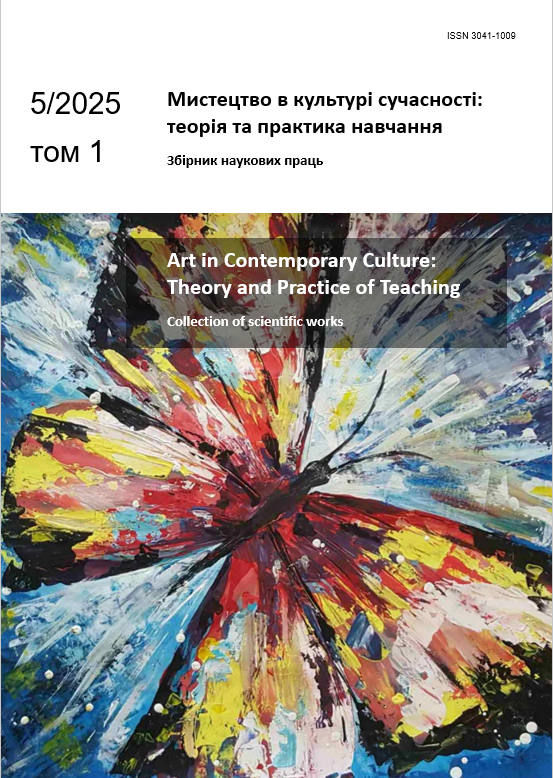THEORETICAL FOUNDATIONS OF THE FORMATION OF PROFESSIONAL COMPETENCIES IN THE PROCESS OF INTERPRETIVE ACTIVITY OF STUDENTS OF THE PERCUSSION CLASS
Published 2025-05-15
Keywords
- class of percussion instruments, competency-based approach, professional competencies, performance competencies, interpretation, interpretive activity

This work is licensed under a Creative Commons Attribution 4.0 International License.
How to Cite
Abstract
The article is devoted to the study of the process of forming professional performance competencies. Due to the growing competition in the labor market and the rapid development of advanced technologies, innovative approaches are being introduced in modern pedagogy. Education, which used to be based on a system of knowledge, skills, and abilities, now considers the personality of the student as the main value and guideline for the teacher. The modern employer wants to see employees not only as carriers of theoretical knowledge, but also as specialists who are confidently oriented in the information space and capable of further self-learning and self-development. As part of this trend, a competency-based approach is being formed in professional education, which is becoming increasingly important. The purpose of the article is to reveal the essence and structure of the interpretive activity of a student of the percussion class, as well as to determine the purpose and objectives of professional training focused on the competence approach. In accordance with the goal and objectives, the stages of students' interpretive activity and types of professional competencies are defined. The study of the theoretical foundations of the formation of professional competencies has established that this process is multidimensional and requires the integration of knowledge, skills and abilities, as well as the development of the creative potential of future performers. The formation of professional competencies should be based on a clearly defined pedagogical strategy based on a competency-based approach. This is an effective methodological basis for the development of professional competencies. The competency-based approach promotes the integration of knowledge, skills and abilities into a single system that ensures the training of highly qualified performers who are able to adapt to the modern requirements of the musical environment. The role of the teacher in the formation of professional competencies is to create an individual trajectory of student development, provide conditions for their creative self-realization, as well as to accompany and support them at every stage of interpretive activity. The essence of the professional competencies of students of the percussion class is the ability to integrate theoretical knowledge, performance skills, and artistic and aesthetic understanding of the work to create a holistic musical image. They include artistic thinking, the ability to analyze and interpret a work, mastery of technical means of performance, as well as skills in solo, ensemble and orchestral formats.
Downloads
References
- Великий тлумачний словник сучасної української мови. Київ, Ірпень: ВТФ «Перун», 2001. 1440 с.
- Дряпіка В.І. Орієнтації студентської молоді на цінності музичної культури: соціально-педагогічний аспект. Інститут педагогіки АПН України. Кіровоград: Держ. центр. укр. вида-во, 1997. 215 с.
- Линенко А.Ф. Педагогічна діяльність і готовність до неї. Одеса: ОКФА. 1995. 80 с.
- Маркова О. М. Інтонаційність музичного мистецтва. Наукове обґрунтування та проблеми педагогіки. Київ: «Музична Україна», 1990. 182 с.
- Масол Л. Концепція загальної мистецької освіти. Мистецтво та освіта. 2004. № 1. С.2-5.
- Нагач М.В. Підготовка майбутніх учителів у школах професійного розвитку в США : автореф. дис. на здобуття наук. ступеня канд. пед. наук: спеціальність 13.00.04 «Теорія і методика професійної освіти» / Київ, 2008. 21 с.
- Овчарук О. Сучасні підходи до розвитку поняття якості освіти: світовий контекст. Моніторінг якості освіти: світові досягнення та українські перспективи. Київ: K.I.C., 2004. С. 15 - 21.
- Пометун О. Компетентнісний підхід - найважливіший орієнтир розвитку сучасної освіти. Рідна школа. 2005. № 1. С. 5 - 6.
- Рало А. Компоненти системи звукоутворення та їх функціонування при грі на звуковисотних клавішних ударних інструментах. Наукові збірки Львівської національної музичної академії імені М. В. Лисенка. Випуск 35 : Студії музикознавчі. Львів, 2015. С. 326-340.
- Юдзіонок Н.М. Формування професійної компетентності вчителя в музично-інтерпретаційній діяльності: деякі результати дослідно-експериментальної роботи. Науковий вісник Південноукраїнського національного педагогічного університету ім. К.Д.Ушинського. №1 - 2. Одеса, 2011. С. 222 - 226.
- Definition and Selection of Competencies. Theoretical and Conceptual Foundations (DESECO). Strategy Paper on Key Competencies. An Overarching Frame of Reference for an Assessment and Research Program - OECD (Draft).





